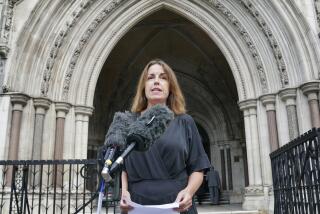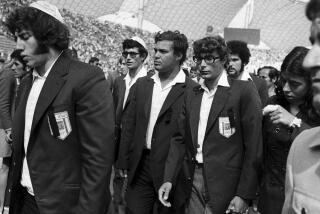Britain Launching Probe of 16 Alleged Nazis
- Share via
LONDON — Britain announced Monday that a government panel will investigate allegations made more than a year ago that 16 Nazi war criminals settled in the country after World War II, including a Lithuanian accused of leading mass executions of Jews.
Home Secretary Douglas Hurd, Cabinet minister in charge of law and order, announced in Parliament the formation of a two-man panel to examine charges that alleged Nazi war criminals settled in Britain after lying to gain entry.
Named to the panel are Britain’s former top prosecutor, Thomas Hetherington, and Scotland’s former top prosecutor, William Chambers.
He also said the panel would recommend whether British law should be changed to allow for their prosecution in Britain, even though the alleged war crimes took place in what is now part of the Soviet Union.
Britain has no extradition treaty with the Soviets, and its treaty with Israel, which claims the right to try those accused of crimes against Jews, does not cover extradition of suspected war criminals.
In October, 1986, the Los Angeles-based Simon Wiesenthal Center presented what it said was evidence that 17 alleged Nazi war criminals had settled in Britain. It accused them of engaging in atrocities against Jews in Nazi-occupied Soviet republics of Lithuania and Lativa.
Hurd told Parliament that 16 people named in the allegations still live in the country and that their wartime activities will be investigated. He did not name or give details of any of the suspects or say what became of the 17th person.
One of them previously was identified publicly as Antanas Gecas, a 71-year-old retired mining engineer and resident of Edinburgh, Scotland. He has admitted belonging to the Lithuanian police force during World War II, but denied killing any Jews during the Nazi occupation.
Officials of the Wiesenthal Center said Gecas led police in mass executions of Jews and even climbed into execution “pits to finish off people who had not been murdered by the machine guns.”
More to Read
Sign up for Essential California
The most important California stories and recommendations in your inbox every morning.
You may occasionally receive promotional content from the Los Angeles Times.












